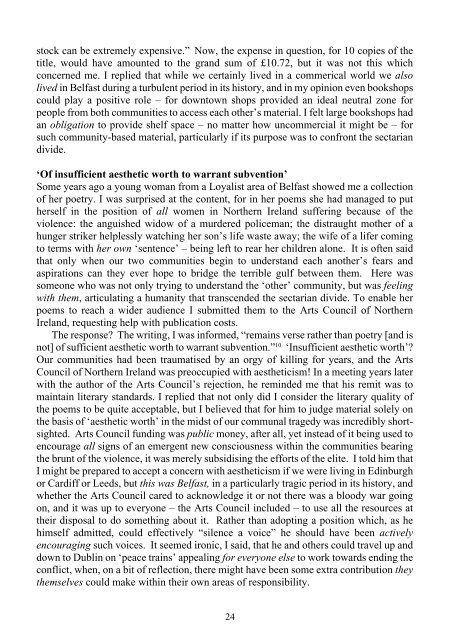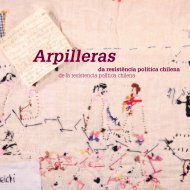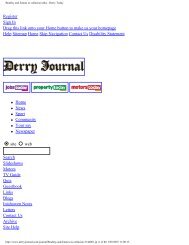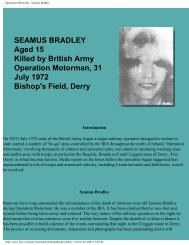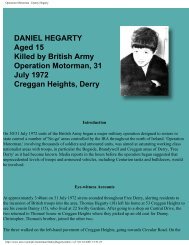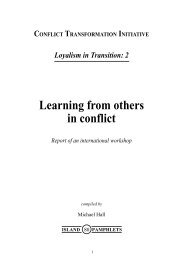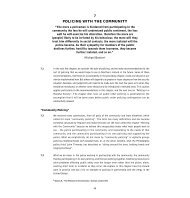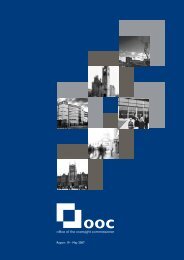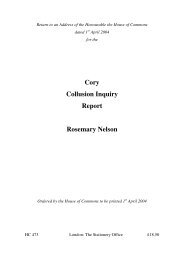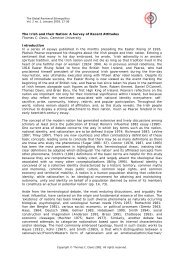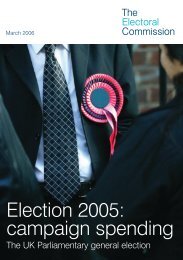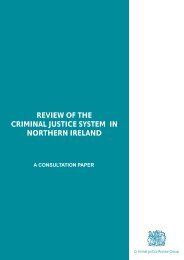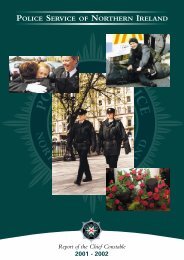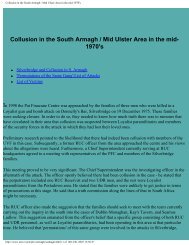(14) Reinforcing Powerlessness - CAIN - University of Ulster
(14) Reinforcing Powerlessness - CAIN - University of Ulster
(14) Reinforcing Powerlessness - CAIN - University of Ulster
Create successful ePaper yourself
Turn your PDF publications into a flip-book with our unique Google optimized e-Paper software.
stock can be extremely expensive.” Now, the expense in question, for 10 copies <strong>of</strong> thetitle, would have amounted to the grand sum <strong>of</strong> £10.72, but it was not this whichconcerned me. I replied that while we certainly lived in a commerical world we alsolived in Belfast during a turbulent period in its history, and in my opinion even bookshopscould play a positive role – for downtown shops provided an ideal neutral zone forpeople from both communities to access each other’s material. I felt large bookshops hadan obligation to provide shelf space – no matter how uncommercial it might be – forsuch community-based material, particularly if its purpose was to confront the sectariandivide.‘Of insufficient aesthetic worth to warrant subvention’Some years ago a young woman from a Loyalist area <strong>of</strong> Belfast showed me a collection<strong>of</strong> her poetry. I was surprised at the content, for in her poems she had managed to putherself in the position <strong>of</strong> all women in Northern Ireland suffering because <strong>of</strong> theviolence: the anguished widow <strong>of</strong> a murdered policeman; the distraught mother <strong>of</strong> ahunger striker helplessly watching her son’s life waste away; the wife <strong>of</strong> a lifer comingto terms with her own ‘sentence’ – being left to rear her children alone. It is <strong>of</strong>ten saidthat only when our two communities begin to understand each another’s fears andaspirations can they ever hope to bridge the terrible gulf between them. Here wassomeone who was not only trying to understand the ‘other’ community, but was feelingwith them, articulating a humanity that transcended the sectarian divide. To enable herpoems to reach a wider audience I submitted them to the Arts Council <strong>of</strong> NorthernIreland, requesting help with publication costs.The response? The writing, I was informed, “remains verse rather than poetry [and isnot] <strong>of</strong> sufficient aesthetic worth to warrant subvention.” 10 ‘Insufficient aesthetic worth’?Our communities had been traumatised by an orgy <strong>of</strong> killing for years, and the ArtsCouncil <strong>of</strong> Northern Ireland was preoccupied with aestheticism! In a meeting years laterwith the author <strong>of</strong> the Arts Council’s rejection, he reminded me that his remit was tomaintain literary standards. I replied that not only did I consider the literary quality <strong>of</strong>the poems to be quite acceptable, but I believed that for him to judge material solely onthe basis <strong>of</strong> ‘aesthetic worth’ in the midst <strong>of</strong> our communal tragedy was incredibly shortsighted.Arts Council funding was public money, after all, yet instead <strong>of</strong> it being used toencourage all signs <strong>of</strong> an emergent new consciousness within the communities bearingthe brunt <strong>of</strong> the violence, it was merely subsidising the efforts <strong>of</strong> the elite. I told him thatI might be prepared to accept a concern with aestheticism if we were living in Edinburghor Cardiff or Leeds, but this was Belfast, in a particularly tragic period in its history, andwhether the Arts Council cared to acknowledge it or not there was a bloody war goingon, and it was up to everyone – the Arts Council included – to use all the resources attheir disposal to do something about it. Rather than adopting a position which, as hehimself admitted, could effectively “silence a voice” he should have been activelyencouraging such voices. It seemed ironic, I said, that he and others could travel up anddown to Dublin on ‘peace trains’ appealing for everyone else to work towards ending theconflict, when, on a bit <strong>of</strong> reflection, there might have been some extra contribution theythemselves could make within their own areas <strong>of</strong> responsibility.24


